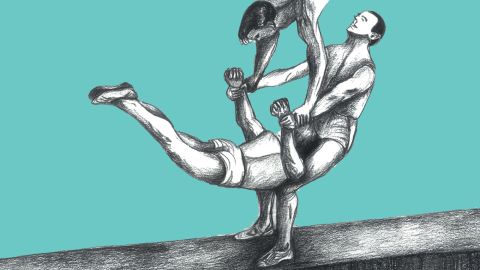Business is the act of making money in a free market.
It’s a “trap word”, because it’s a big complex process and when we assign a single word to those, our brain cannot grasp the whole idea and promptly blocks further thought to prevent a confusion overload. But we’re here to clear the fog.
Let’s suppose you want to start one. You’re excited about your idea but anxious and mostly don’t know what you’re doing. You’ve read that 90% of businesses fail and this doesn’t sound promising at all.
How to engage your business idea then? Here are a few reassuring facts to get your optimism back:
- You and other people participate in a free market of goods, services, labor, attention, and information.
- Most other people don’t know shit about how to handle all this value flow and just copy everyone around them.
- Due to supply and demand laws in the free market, the more the people in the same business, the more fucked up they get.
- To give the world something with a demand that won’t be copied by many others, makes you win big in The Game of Life.
- You can give it in a billion ways, the existing options are almost infinite. Try ideas wisely following the speed and scale rules.
What do you want from a business? There are 2 main ideas – to be happy (do what you love… or love what you do, if it wasn’t the expected) and to be successful/profitable.
To be happy is a personal thing, you’ll probably find your way, everyone is different in this regard. So let’s focus on being successful. Because if you’re happy but it all fails, happiness will be short-lived. Will be back to this shortly.
Here are some core business success principles:
- If you manage to accumulate any type of value every day/week/month, you eventually get a lot over time. (create assets)
- Don’t trust the future. Projects that require constant investments or hard work will fail when you feel low or times are bad. (don’t create liabilities)
- Don’t have a single point of failure in a big project, always have backup plans of similar value. There are always surprises. (don’t lean into optimism)
- Don’t launch with an indispensable co-founder. People part ways for various reasons and this should not end the business too. (don’t be long term dependable)
Side note: I very much like “don’t…” pieces of advice. While not everyone is a fan of negative statements, you have thousands of options in your life. If I suggest you do X, I limit your freedom significantly. If I tell you don’t do X… you still have thousands of other options that actually exist and not contain X. 99% of them are options people would define as crazy but some of them would actually work and the width of your idea base is precious. Tell someone what to do and you deprive them of the width. Tell them what not to do and you not only don’t limit their freedom that much, in the typical case of tunnel vision you actually increase their freedom 🙂
Now lets define the bad practices in more detail so you learn to avoid them. If you observe others engage in bad practices and are not in a position to change their mind, at least learn from their failure – this way you don’t have to fail on your own in every possible regard.
The number one reason for the failure of a business idea is… trying to make people happy!?
You try to make people happy too much while neglecting the money earning part. Now, this can easily be missunderstood for an advice to be a commecially driven asshole. This is not what I mean.
What is the most important predictor for your business idea’s success? Your education, experience, starting resources? They matter but the world is not about you as much as you want. The number one predictor is not related to you, it’s your industry.
Let’s look at 2 real businesses – running a restaurant vs running an SEO consultancy (one gives advice on how to rank your website in Google).
60% of restaurants fail within the first year and nearly 80% close within 5 years. Everyone thinks they will be the outlier to succeed but you can’t argue with statistics. It’s a tough business with endless working hours, responsibility for the clients’ health and you need a number of licenses. You cannot really pick your customers so you get an occasional douchebag or drama queen. And the mothly balance starts in the red with a huge rent expense because you need a great location.
Meanwhile it’s just about impossible to fail as an SEO consultant while billing clients $100 an hour and paying no rent, licences, expensive education or any other expences. While you make your own marketing almost for free (ranking at will in Google for “SEO consultant + your city”) and you can easily offer the service remotely all over the world if there is demand.
Not to mention educating clueless people about their miserable SEO is really easy, you don’t need any long term education (takes half a year of full time traning to start giving actual value and 2-3 years to be close to 100% effective). An SEO audit is usually like the service a barber gives a man who spent the last 3 years shipwrecked on a deserted island. The haircut and beard are in such a condition that any touch makes them better 🙂 This is how bad the average SEO condition of a website is.
On the other hand running a restaurant if you never handled employees before or your chef has half a year of experience will be a (very valuable for your life experience) full blown disaster.
So how is it possible that people still open restaurants and no one outside the IT-sphere believes me when I tell them SEO is a gold mine?
There are two main reasons. The first one is obvious, people are not well informed about the benefits of SEO and the risks of a restaurant. But there’s more.
In the very related money post, I state that money is the thing people believe in the most, a belief more universally accepted than religions. But if they believe in money so much, how can they be so irrational when choosing industries? Every restaurant founder knows they will probably not get rich and the effort will be huge but this doesn’t stop them.
Turns out most humans have two very strong desires that battle with the money need for the space in their heads.
- Making people happy
- Creating cool stuff
Both are invaluable for humanity. We need happiness and innovation, and there is no limit, the more the better.
There is just one problem. The free market… hm… doesn’t have this fully covered.
Sure, making people happy means great products and services. The places with a better service attract more people to eat there.
Sure, creating cool stuff means great products and services. The places with better food attract more people to eat there.
However, all this just controls the success of restaurants relative to each other. Not the industry’s success which is defined by overall supply and overall demand.
The demand for restaurants is relatively stable. If the food is delicious it will increase a bit but it has a limit.
The supply is well… too much. So many potential restaurant founders want to both make people happy and create cool stuff that 60% of restaurants fail within a year due to not attracting enough customers.
Now don’t get me wrong, I love restaurants. I couldn’t imagine my life without them and treat everyone running or working in any of them with absolute respect. But why does a whole industry have to live on the verge of bankruptcy, creating stress for everyone working in it, often having to underpay employees or compromise on the food quality… just to survive? All because of the 20% extra overenthusiastic founders who just wanted to make people happy and create cool stuff, who didn’t understand economics enough or care about the worse big picture they are creating for everyone like them.
This is a typical example of how rationally thought out systems like the free market fail when colliding with the emotions of people. And we’re talking about the best of emotions and intentions here. But intentions are not enough – we all need much more industry understanding. Because The Game of Life has one goal above all – to get closer to reality. Everything else is easy then. Including choosing the right business idea that doesn’t exist. Or does. Or maybe people are on it already, like the SEO consultants. And no one believes you can earn $100 an hour after a year of training with no previous experience. And people currently stuck in sheep mode don’t want to even explore the option.
To recap, trying to make people happy gets you in overcrowded industries. So many people want to make others happy that I… actually have great hopes for the future of humanity 🙂 All this is wonderful! But we live in a financial system (the free market) that punishes too many people who offer the same thing (supply). So most people who want to make others happy, end up stressed up in competitive small margin industries with high bankruptcy risk and ironically, sometimes unhappy themselves. Unfair 🙁
If you want to make people happy, you are a wonderful human being. Just the mixing with business ideas and making money is what you should be careful about 🙂
The number two reason for the failure of a business idea is… trying to make cool stuff!?
We already talked about how making cool stuff gets us more restaurants than we need. But at least we need food, the supply is a bit more than the demand, far from ideal but workable. Now let’s get to more extreme cases. In the restaurant usually the primary incentive is the make people happy and the secondary is the make cool things. Reverse it and you risk a total disconnection from reality.
Choosing your industry or niche just because it’s cool is not like rolling the financial dice. It’s actually worse than picking at random.
When you want to make people happy you’re getting into overcrowded industries and it sucks but at least you and almost every customer have a near-perfect alignment – you want them happy and they want themselves happy. So you’re nice and a lot of mutual smiling takes place. You succeed 90% of the time. People are ready to pay extra money so someone is nice to them and you get this extra money 90% of the time.
Now imagine trying to create something that 90% of people would think is very very cool (enough to pay for it). Impossible. So not only are you in an overcrowded space (among all the other wanna-create-cool-stuff people), but now you also managed to shrink the demand even more.
And… sorry but… thinking you are making something cool does not mean it actually is. We all tend to be very biased in this regard. So biased that we often do not want to check if our wanna-be-cool-thing already exists somewhere else. Often out of the hidden fear that it just might, killing our amazing feeling of orginality and self-value. If this happens you should smack yourself back to reality and spend some good time Googling and asking in related Facebook groups whether your idea does or doesn’t exist.
If creating cool stuff is not financially sustainable, you should call it a hobby and it’s wonderful to have one. Just don’t live with the idea, the expectations (and the resulting pressure) that it has to become a business. It may or may not and it’s fine either way. If any pressure exists, you’re not on the right path.
The number three reason for the failure of a business idea is… you create more liabilities than assets.
It’s very important to be able to evaluate assets and liabilities and how they project over longer periods of time. Humans are not the best at long-term valuations so it requires experience until you start getting it intuitively.
Let’s define the two extremes.
- Assets that create money over time with no extra cost (passive income).
We’re leaving aside cases where you own properties and rent them (too much-starting capital needed) or where you invest in things like the stock market (it’s risky). We’re trying to make passive income out of normal small starting capital.
Keep in mind that “passive income” is massively misunderstood and used for malicious manipulation. The only case something brings you passive income is when you tested it yourself and it works, period. Never believe other people, companies, courses, or ads about this.
Most people’s road to passive income seems kinda backward:
They want to have a normal income, then make it passive. This means achieving two things one after another:
- Create a successful sustainable business
- Delegate it to a trusted manager so you don’t have to work 24/7 for it
Both are hard. The second part sounds easy but considering you’ll be in maintenance mode and mostly trying to cut losses from the transition, there will be sheep mode problems with the delegation. Also, remember that customers and partners don’t trust companies. It’s people who trust people. Whoever you put in your place to run the business needs to be trusted not only by you but by all your partners and customers. Not an easy thing.
I’ve found another road to be easier. Especially in the digital world.
Start with almost-zero-but-passive income. Say earn $100 every month for something you do in 1 minute.
Then scale.
Both my successful passive income streams (digital ones) happened exactly in this way. Actually, I didn’t know they were a thing until the first money arrived. The ease was the sign I needed to scale. Ease is precious 🙂
Now let’s look at the ugly extreme opposite.
- Liabilities that drain money over time with no extra benefit (burn).
Any loans fall into this category but we’re not talking only about money here. Time is actually the most valuable asset so any time sinks should be avoided. The most typical drains of time and energy are very annoying customers. You should try to avoid them at all costs and being able to choose your customers is a huge advantage in business.
Time and business experience side note:
Just learn to “feel how money stretches over time” so you can assess assets and liabilities better. It’s not natural and takes time. Sometimes looking back helps when you get some experience. To make looking back more effective, the experience should be as diverse as possible. This often means going against usual common sense and:
- Do many things at once.
- Leave things incomplete.
Experience is the most precious thing in The Game of Life as it’s deep, intuitive learning with no extra effort.
When modern Silicon Valley culture glorifies failure as a learning experience, what they actually value is not failure, it’s the diversity of experience that failure always brings.
Since it would be weird to fail on purpose just for the experience, you can achieve the same result by doing many things at once and leaving non-critical things (that have exhausted their potential to give you something new) incomplete, no matter how stupid this may seem to your peers. Your journey is yours and if you’re in for the long run, diverse experience brings more than achievements on paper.
The number four reason for the failure of a business idea is… single point of failure.
A really good idea may have points of failure but can always be resurrected into existence.
If your idea has a potentially probable event that obliterates it completely in all its forms, this means four things:
- You will have to live with this possibility which will be extra pressure on your side with all the related downsides.
- Even if you are able to live with the risk, others may not like it. You will have a harder time finding employees, partners and investors.
- The overall ROI (Return on investment) of the project gets lower as the crash can actually happen. Also, humans are good at underestimating these kinds of disasters. Just because it hasn’t crashed yet, doesn’t mean it won’t (The Gambler’s fallacy).
- Ideas with single points of failure are not flexible in general and probably have other points of complete or partial failure you didn’t think about yet.
The moral is to have flexible ideas and if possible, multiple revenue streams.
It often helps to imagine the worst possible realistic thing that can happen to your business in a business sense (eg. not someone dying but say losing all your current product supplies). Will this bring you down forever? If the answer is yes, try to gradually diversify until it becomes no.
The number five reason for the failure of a business idea is… not understanding how to be dependable.
I’ll give you the gold right away. It’s time again.
Short-term dependencies are perfectly fine. You must in fact learn to lean onto employees, trust them, and delegate (which is much harder than it seems, especially if you’re a perfectionist). And compromise regarding time. It’s sometimes better for an employee to complete a task with 80% efficiency instead of you at 98% because you can focus the time and energy elsewhere.
Long-term dependencies are a bitch very tricky. This usually includes your business co-founder if you have one.
Co-founding a business with someone where you would not be able to run it individually (due to both your specific skill sets being needed) is a marriage where a potential divorce will burn the business down. Proceed with extreme caution. Your co-founder may be an amazing person but this is just the start of the acceptance criteria.
Are you both equally and fully invested? Do your long term visions coincide? Are there any other big projects any of you engage in? Does one of you still have a day job? Or has to look after his 4 children and 7 pets? Or looks lazy and half-motivated? Or burned out? Or just desperately wants to quit something and start anything new right now? Or drinks too much or does drugs? Or has a poor previous record of their joint ventures?
The questions are many and any single one of these can be life-ending for your business idea. This is the price of long-term dependency.
Starting a business with someone else can be fun… but can and often does become ugly in time.
Just don’t have high expectations is all I’m saying 🙂
If you feel the senior partner (more experienced, more resources) in the potential partnership, always consider can’t you just hire the junior one. This can always be upgraded into a partnership. And you can have the same fun as employer and employee.
If you feel the junior partner (less experienced, fewer recourses) ask yourself will you have any control over the whole thing at all. Also, a common trap is that you expect your senior partner to contribute time and know-how while they want to contribute only resources, giving them a more investor-like role you don’t feel comfortable with since you don’t feel confident enough on your own.
If the founders are 3, things get more complicated (for better or worse). While the risk of trouble increases, at least in this case if one of the three bails out for whatever reason, the other two may be able to hold the business together.
Our (very honest) investors once had to evaluate the rare case of a company with 4 founders. Their exact words were “a recipe for disaster” 🙂
In general keep in mind, most long-term dependencies will be failures sooner or later so enjoy them while they last and don’t expect anything to be forever.
And finally, the number six reason for the failure of a business is… having no idea but desperately wanting to have one.
Hello, Franchising. Not to be rude or anything, but you suck on every possible level.
To every wanna-be-business-owner – never even consider joining a big traditional franchise like McDonald’s, Starbucks, Subway, or 7-Eleven. In my view, this is the closest you can get to actual slavery (not counting actual slavery, which sadly also exists). It’s the worst hybrid of having a day job and having a business, taking strictly the very worst from both – lack of freedom, lack of diversity and high risks.
Let’s just mention that franchisees are responsible for some of the worst food in the world. “Healthy, fresh food” and “Economies of scale” rarely come in the same sentence.
Franchising is the concept of a franchisor (usually a huge corporation) giving a business concept and resources to a franchisee (small business owner) in exchange for a cut of the sales and signing a contract where the small business signs all their freedom away, losing all their power to brand, market or differentiate itself from the main brand.
Basically, it’s just a well-calculated squeeze of human labor for profit where the basic rights to invent and learn by doing are gone. Also just like slavery when you get in it’s not so easy to get out. The entry barrier is often a 6-7 figure sum most people take a loan for… so you and your employees are in for a long struggle.
Even from a purely economic perspective, the whole thing has only the franchisor to benefit. Every concept where you give your freedom away to a large corporation and hope that your interests have a chance against shareholder value is extremely naive. And in this case, you take all the risks and they take most of the profit. In such cases manipulation is just inevitable. Here is a good dive into the practices of Subway.
If you want to start a business but the idea doesn’t exist yet, chill, don’t throw yourself into the first silly direction the world wants to manipulate you in. The best ideas are not the mainstream ones according to supply and demand rules. And don’t just sacrifice your freedom like this.
Freedom is one of the basic resources in The Game of Life as it gives you the chance to take good unexpected opportunities. The ones life is full of if you are in a good environment. And the ones you can choose to change and improve your environment.
Also, we no longer live in the age where you can try a few business ideas for your entire life. The dynamics of the Internet with its instant flow of value (attention and money) in a hyper-connected system with very low costs are a whole new world, well worth exploring. You can test multiple business models within a year. Most will fail but remember, the costs are so low you only need to succeed once.
Most importantly, the more you try, the more you learn. In the short term (if in Hunter mode and following good practices) you can just go for it without much thought on every individual action. To quote someone, who, despite his personal shortcomings, created better stuff than McDonald’s ever will:
Stay Hungry, Stay Foolish.
To summarize:
A business does not exist. Instead, think of its two components separately:
- You should be happy – by making others happy or creating cool stuff (The Game of Self part)
- You should be profitable (The Game of Life part)
If you have just the first, you have a hobby, not a business and your expectations should be reduced accordingly.
If you have just the second, changes are needed immediately, money can help changes though as money = many kinds of freedom. Just don’t miss the moment!
To be happy and sustainable, you should have them both. But it doesn’t have to be the same activity that brings them. If you’re a Wall Street broker but you invest half your money into non-profit building schools in Africa and this makes you happy, there is nothing missing. There is nothing bad in taking advantage of a broken system (if no people suffer as a result) if you use the resulting profits for a good cause 🙂
By decoupling the sharing/happiness bringing part from the money-making part we can (maybe) rebalance the economy a bit. Otherwise, we’re doomed to repeat the cycle of the people with the best intentions ending up in the overcrowded, underpaid, and stressful industries of serving others. Just because the nice people are many…
All while high demand B2B services like SEO cost $100 an hour by a spoiled consultant who can afford to hang the phone on any client if they simply don’t like them enough.
To have your business idea succeed financially you need:
- The right industry (non-people-helping, non-cool), which you’ll spot easily if you understand The Game of Life well;
- A business model that slowly earns a lot of money over time and doesn’t have an ongoing burn of time/energy/money;
- The ability to choose your customers and avoid the very annoying ones;
- No single points of failure; Freedom, flexibility and diverse income streams;
- No co-founder or a magically compatible one; Employees you like and can depend on;
- The right market size. We try to do stuff tough for freelancers but not big enough to attract huge-company-competition;
- Many other mainstream things that are mentioned elsewhere 🙂 Remember, we focus on what the world ignores.
Life is unfair to many businesses but this is actually your advantage. Be in the industries where success exists. But don’t forget to share back to the ones left-back by the mix of the free market, unfair information access and human emotions. Every Taxi/Uber ride and every restaurant visit is a chance to give back to all of those who don’t understand economics but just want to make people happy 🙂
Life is circular.




























